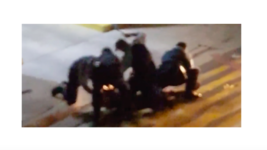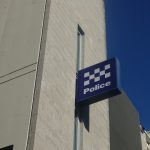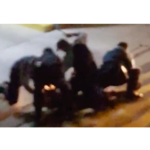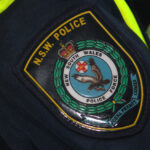NSW Police Officer Found Not Guilty of Assaulting Naked Teen

The police officer charged with assault after striking a restrained, naked teenager 18 times with a baton has been found not guilty.
Officer Michial Greenhalgh was charged following an inquiry by the Law Enforcement Conduct Commission (LECC) into the arrest of the naked teenager in Byron Bay in 2018.
He pleaded not guilty to one charge of common assault over the young man’s arrest – the remaining three officers were cleared of any wrongdoing by the LECC.
Magistrate Michael Dakin – a former police officer who now presides over Lismore Local Court – heard that Senior Constable Greenhalgh struck the teenager 18 times with a baton, but the charge of common assault only related to six strikes that occurred after the boy had been placed in two sets of handcuffs while restrained on the ground by four police officers.
The officer was not before the court for the more serious offence of assault occasioning actual bodily harm, despite the fact that the boy was taken to Tweed Heads Hospital later in the night where he was found to have sustained a fractured rib and extensive bruising to his limbs and torso.
LECC Inquiry
At the time of the young man’s arrest, disturbing smartphone video footage taken by bystanders played out across the nation, depicting four officers pinning the naked teenager to the ground, calling him a “fucking loser” and a “cunt”, and Senior Constable Greenhalgh repeatedly and forcefully striking him with a baton as he cried out for help.
The footage sparked the subsequent LECC inquiry, which heard that the boy, who cannot be named for legal reasons, and was only 16 years old at the time of the incident, has Asperger Syndrome, and after dinner with his parents, went for a walk on his own and ended up in the alleyway disoriented and without clothing.
The inquiry also heard that the teen’s parents were staying in touch with the young man by phone, but lost contact and, concerned for his welfare, called local police. They were not informed that the young man had been arrested until police contacted them several hours later to say that he was being treated in a local hospital.
While police originally testified to the LECC that the boy was ‘unpredictable,’ and appeared to be under the influence of drugs, the LECC’s ultimate finding was that Senior Constable Greenhalgh should be charged for using “grossly excessive force.”
Officer found not guilty
The officer was indeed charged, but last week Magistrate Dakin found Officer Michial Greenhalgh not guilty of assault on the basis that the strikes were “reasonable” given the teens “volatile and unpredictable” behaviour.
In reaching that finding, the Magistrate relied heavily on video footage taken at Byron Bay Police Station later that night, which the judicial officer found was “significant” because it showed the teen acting in a “volatile manner.”
Despite the damning footage of the actual incident itself, Magistrate Dakin said the ensuing police station footage supported Senior Constable Greenhalgh’s testimony that he believed the baton strikes were justified because the boy’s compliance was not absolute.
The Presiding Magistrate also gave significant weight to the fact there were pauses between six of the strikes.
“[If it was] someone who had lost control … there would have not been any gaps in strikes,” Magistrate Dakin remarked.
Community concern
The decision has shocked many who watched the video of the incident – one which has left residents in the small town of Byron Bay with grave concerns about their police force.
Many feel the Magistrate gave undue weight to the (unreleased) CCTV footage taken later at the police station which, of course, some time after the boy had already been severely beaten.
The video of the actual assault should, in the eyes of many, have been seen as the primary evidence relating to the charge of assault. That footage showed, many believe, that the officer’s response was disproportionate and excessive, which amounts to an assault under the criminal law.
At the time of the incident, the local Byron Bay community expressed outrage over the force used by the officers against the naked teen, and many are disappointed that despite the LECC inquiry finding that “grossly excessive force” was used, none of the officers involved will be held accountable for their treatment of a young man who was clearly in need of help, and calling for help.
If that isn’t excessive force, what is?
The Magistrate’s decision has many now asking, ‘if that wasn’t excessive force, what is?’.
In other words, if it is not excessive for four grown, heavily armed men to hold down a naked 16-year old and one of the men, while the boy is screaming for help, call him a “fucking loser” and a “cunt”, and aggressively strike him 18 times with a baton, then what is excessive?
Increasingly around the country, video footage is being released of police officers using unnecessary force while making arrests, yet officers are rarely disciplined, let alone prosecuted.
Those who are prosecuted sometimes appear to be achieving acquittals in the face of overwhelming evidence against them; evidence that would often put normal citizens away for a significant period of time.
The young man’s family is reportedly “shocked” and “lost for words” at the outcome of the court case, and is looking for other ways to seek justice.
The law on excessive force in New South Wales
Section 230 of the Law Enforcement (Powers and Responsibilities) Act 2002 provides that “[i]t is lawful for a police officer exercising a function under this Act or any other Act or law in relation to an individual or a thing, and anyone helping the police officer, to use such force as is reasonably necessary to exercise the function”.
In addition to this, section 231 of the LEPRA states that “[a] police officer or other person who exercises a power to arrest another person may use such force as is reasonably necessary to make the arrest or to prevent the escape of the person after arrest.”
Any force beyond this is considered excessive force and is an assault under the law; but it appears from the above and other recent assaults by police that the law is not always correctly applied by courts of law.








